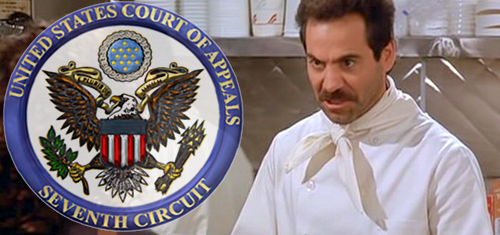 Some Illinois grifters have lost their latest bid to recover money lost on online gambling sites owned by Canada’s Amaya Gaming.
Some Illinois grifters have lost their latest bid to recover money lost on online gambling sites owned by Canada’s Amaya Gaming.
On Friday, the Seventh Circuit Court of Appeals upheld an Illinois lower court’s ruling rejecting a bid by Kelly Sonnenberg and her son Casey and Judy Fahrner and her son Daniel to recover moneys lost gambling on PokerStars and Full Tilt before the two sites left the US market following the 2011 Black Friday indictments.
The mother-and-son tandems filed their suits in 2012 under the Illinois Loss Recovery Act (ILRA), one of those archaic nineteenth century statutes that allow individuals to sue to recover “illegal gambling” losses, including other gamblers’ losses. This nuisance suit used to be Isai and Mark Scheinberg’s problem, but Amaya acquired the Stars and Tilt operations in 2014, and here we are.
Lower courts rejected the sons’ ILRA claims because they’d failed to file within the six-month window for gamblers seeking to recover their own losses. The mothers were allowed to pursue their claims on behalf of their sons’ losses, but courts ruled that a poker operator was merely the keeper of the house, not the individual who won the sons’ money.
Writing for the Seventh Circuit three-judge panel, Judge Richard Posner said that the poker operators “are not the winners of any game that any of the plaintiffs (or their sons) played.” Posner went on to say that “charging a fee for engaging in gambling is not the same as winning a gamble; a croupier who supervises a casino’s poker game is not a gambler, let alone a winner.”
Posner went on to say that siding with the plaintiffs would only encourage Illinois residents to gamble online, safe in the knowledge that “gamblers couldn’t lose any money there because the hosts of the websites would have to reimburse any losses they incurred.” Posner described this as the “heads I win, tails you lose” maxim.
Posner noted that the ILRA dated from “an era of strong opposition in Illinois to gambling. That era has ended, and the laws are gradually being relaxed … creating legal remedies for gambling losses as a way to discourage gambling seems a lost cause, since the usual gambling ‘loss’ is not a real loss … a gambler knows that the money he puts in the pot is at risk. It is not a risk he has to take; he takes it because he hopes to win the pot, or simply because he likes gambling or risk taking in general.”
Amaya is currently embroiled in a similar legal brouhaha in Kentucky, which has a statute on its books similar to the ILRA. That case was brought by the state government, which is suing to recover gambling losses – not just the rake earned by the sites – by all state residents who played on Stars and Tilt prior to Black Friday.
In November, Franklin Circuit Court Judge Thomas Wingate awarded the state $290m in damages, and since Kentucky law allows for the possibility of treble damages, Wingate upped the award to $870m shortly before Christmas. Amaya continues to fight the good fight but has said it would ask the Scheinbergs to pay any damages should the fight not go Amaya’s way.
